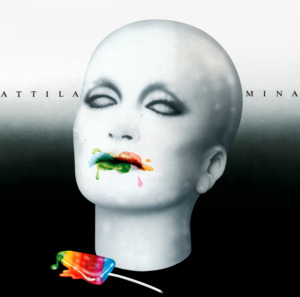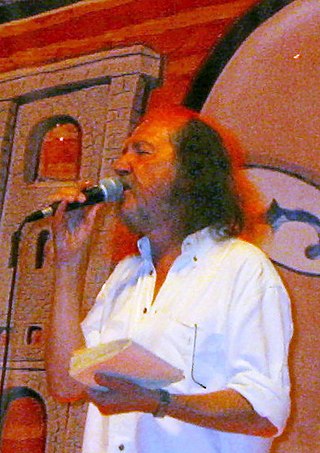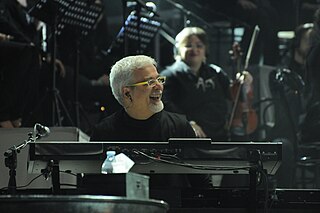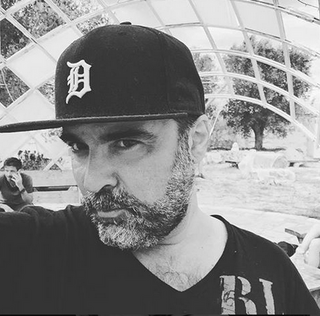
A singer-songwriter is a musician who writes, composes, and performs their own musical material, including lyrics and melodies. In the United States, the category is built on the folk-acoustic tradition with a guitar, although this role has transmuted through different eras of popular music. Traditionally, these musicians would write and sing songs personal to them. Singer-songwriters often provide the sole musical accompaniment to an entire song. The piano is also an instrument of choice.

Salvatore "Toto" Cutugno was an Italian pop singer-songwriter, musician, and television presenter. He was best known for his worldwide hit song, "L'Italiano", released on his 1983 album of the same title. Cutugno also won the Eurovision Song Contest 1990 held in Zagreb, SFR Yugoslavia, with the song "Insieme: 1992", for which he wrote both the lyrics and music. He has been described as "one of the most popular singers in Italy and a symbol of Italian melody abroad", as well as "one of the most popular Italian performers on a global scale" and "one of the most successful Italian songwriters of all time", selling over 100 million records worldwide.

Edoardo Bennato is an Italian singer-songwriter. He is the brother of the singer-songwriter Eugenio Bennato.

Adelmo Fornaciari, more commonly known by his stage name Zucchero Fornaciari or simply Zucchero, is an Italian singer, musician and songwriter. His stage name is the Italian word for "sugar", as his elementary teacher used to call him. His music is largely inspired by gospel, soul, blues and rock music, and alternates between Italian ballads and more rhythmic R&B-boogie-like pieces. He is credited as the "father of Italian blues", introducing blues to the big stage in Italy. He is one of the few European blues artists who still enjoys great international success.

Domenica Rita Adriana Bertè, known professionally as Mia Martini, was an Italian singer, songwriter and musician. She is considered, by many experts, one of the most important and expressive female voices of Italian music, characterised by her interpretative intensity and her soulful performance.

Francesco De Gregori OMRI is an Italian singer-songwriter. In Italy, he is popularly known as "Il Principe dei cantautori", a nickname referring to the elegance of his lyrics. Although often referred as singer-songwriter and poet, he prefers to be identified simply as "artist".

Giuseppe Daniele, known as Pino Daniele, was an Italian singer, songwriter and musician. His influences covered a wide number of genres, including pop, blues, jazz, and Italian and Middle Eastern music.

Attila is a studio album by Italian singer Mina, released on October 1979 by PDU.

Azimut is the fifth studio album by Italian singer-songwriter Alice, released in 1982 on EMI Music.

Il sole nella pioggia is the eleventh studio album by Italian singer-songwriter Alice, released in 1989 on EMI Music.

Claudio Lolli was an Italian singer-songwriter, poet, writer and secondary school teacher.

Umanamente uomo: il sogno is an album by the Italian singer-songwriter Lucio Battisti. It was released in April 1972 by Numero Uno.

Luca Carboni is an Italian singer-songwriter. He debuted in 1981 as guitarist in the band Teobaldi Rock, publishing his first solo album in 1984. He is also a painter and carpenter.
Sentieri selvaggi is an Italian musical ensemble, specialising in contemporary music. Its name means "Wild Trails" in English.

Michele Zarrillo is an Italian singer-songwriter. He is mainly known for hits such as "Una rosa blu", "Cinque giorni", L'elefante e la farfalla and "La notte dei pensieri". In 1987 he won the Sanremo Music Festival, competing in the newcomers' section. Zarrillo took part in the competition several other times, the last time in 2020 with the song "Nell'estasi o nel fango". He took part in Sanremo's competition 13 times, but only won once, as stated above.

Alberto Camerini is an Italian singer-songwriter and musician, who was commercially most active during the late-1970s and early-1980s.

Danilo Madonia is an Italian musician, composer, producer and arranger.

Cristiano De André is an Italian singer-songwriter and musician. During his career, he competed four times in the Sanremo Music Festival, receiving three Critics' Awards.

Diego Mancino is an Italian musician and singer-songwriter.
Andrea Oliviero Laszlo De Simone Saccà is an Italian singer-songwriter and musician.


















